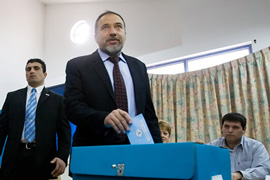Israelis vote in tight election
Kadima and Likud locked in close race with Israel’s security topping election agenda.

“Polling has got off to a quiet start in Jerusalem,” Sehmer said. “I think its probably because of the weather – it’s quite cold and wet.”
The vote to elect a new Knesset, the Israeli parliament, has become a close-run contest between Kadima, which heads the current ruling coalition, and the opposition Likud party, led by Benyamin Netanyahu.
Tzipi Livni, the foreign minister and Kadima leader, insisted on Monday that her party was best placed to achieve Israeli unity and that “victory is in reach”.
“If Kadima gets just one mandate more than Likud, we will be able to form a governing coalition as we are a centrist party that can bring together the right and the left,” she said.
Coalition factor
Under the Israeli election system it is the person deemed most likely to form a governing coalition who will be charged with forming a government, and Netanyahu has stressed he would also seek a broad coalition.
| In depth |
 Al Jazeera’s coverage of the Israel elections
|
“A narrow government would not be in a position to face the challenges posed by the threat of a nuclear Iran, Hamas, rocket fire and the economic crisis,” he said.
Kadima is almost neck-and-neck with Likud, with the last opinion polls ahead of the election predicting it to win between 23 and 25 seats, while Likud is likely to win between 25 and 27.
Opinion polls have also indicated that the country’s right-wing parties will make significant gains.
Yisrael Beiteinu, led by Avigdor Lieberman, could hold the key to the formation of a new government with opinion polls suggesting that his party would take third place.
His campaign slogan “no loyalty, no citizenship” has angered Palestinian-Israelis who he proposes should take an oath of loyalty to Israel.
Gaza impact
Early voting took place on Monday in some areas of Israel and the West Bank, with soldiers on remote bases among those allowed to cast their ballot.
Israel’s three-week assault on Gaza that ended last month had a “huge impact” on Israeli society in the run-up to the election, Gil Hoffman, a political analyst and chief correspondent for the Jerusalem Post, said.
 |
| Lieberman could play an important role in forming a new goverment [AFP] |
“Here, at first, it looked like the war would be helping out the Likud party. Then it really turned out that it helped the Yisrael Beiteinu party, which is an ultra patriotic party. The atmosphere was very helpful to that party,” he said.
“There are certainly many undecided voters, a lot of people are going to be deciding what they are going to do when they get to the polling station … that really says something about how unattractive our candidates are.”
Livni has distanced herself from promises made by Ehud Olmert, the former Kadima leader, to remove 60,000 West Bank settlers – a move reflecting the hardening mood in Israel, subsequent to the Gaza conflict.
Once the election results are in, Shimon Peres, Israel’s president, will ask the head of the party with the most votes to form a government within 28 days, a period which the president could extend by up to 14 days.
To achieve a majority, a party or coalition must hold more than 60 of the Knesset’s 120 seats.
